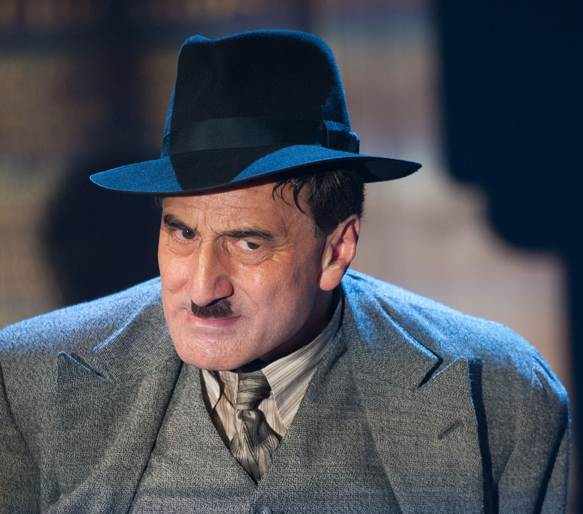
Upon arriving at the Duchess Theatre, you are ushered into a Chicago speakeasy, complete with dapper fedora-hatted men chatting around cafe tables and a ragtime jazz ensemble. The atmosphere brings you into the world of 1930s Chicago, with its shady underworld activities, particularly those surrounding the trade in cauliflowers and other vegetables. Witness one, Arturo Ui, comedically awkward and corrupt gangland boss, and see him rise from a minor player in Chicago's underworld, to a dictator seizing power as he ruthlessly destroys those around him.
Bertolt Brecht's satirical play, The Resistable Rise of Arturo Ui, was written in the course of three weeks in 1941 whilst Brecht, who had been exiled from Germany under the Nazi regime, awaited immigration to the U.S. The play was never performed during Brecht's lifetime, and it is a brilliant satire of Hitler's rise to power and tyrrany in Germany. It has been compared to Chaplin's satiric film, The Great Dictator. The characters in Brecht's play have direct counterparts in their contemporaries of the day.
This play is fast-paced throughout the first act, with many comedic moments, clearly dipicting Ui as a pathetic nobody. At times, the play verges on slapstick, and there are some brilliant pieces of physical comedy. The hilarious scene where Ui is being coached by a veteran actor, played with brilliance by Keith Baxter, is where he starts developing the grand gestures and stiff-armed salutes which are a direct parody of Hitler's own mannerisms. The play and the characters become darker as the play progresses, though, and at times, it feels overwrought. There are moments where the play could be a scene from the Untouchables or some other classic gangster film. The verse-like translation by George Tabori lends it a peculiarly Shakespearean feel, which also heightens the gravity of the characters, particularly in the second act.
Henry Goodman plays Ui with swagger and sinister aplomb, and it is clear that he only succeeds in his efforts due to his exploitation of corruptness in high places. His friend and henchman, Ernie Roma, is excellently played by Michael Feast, while David Sturzaker is the slick, suave and scheming florist, Givola. Venerable Dogsborough, the seemingly upright and honourable, is well-played by William Gaunt, and Lizzy McInnerny's emotive and strong Betty Dullfoot gives off sparks. Many of the cast double-up to play multiple characters with great skill. Joe McGann is excellent as both Giri and the judge O'Casey.
The sets and lighting designed by Simon Higlett and Tim Mitchell effectively re-create a smokey, gritty Chicago of docks, warehouses and run-down speakeasys, creating a film-noir effect, up until the end, where the banners unfurl and the stage becomes a podium hinting at the 1936 Olympic Games in Berlin.
This really is a "gangster show to end all gangster shows". It is indeed irresistible.
Until December 7 at the Duchess Theatre, 3-5 Catherine Street, WC2B 5LA. Tickets may be purchased from the Box Office at 0844 482 9672 or booked directly on the website.
We saw the show on a complimentary press ticket.



